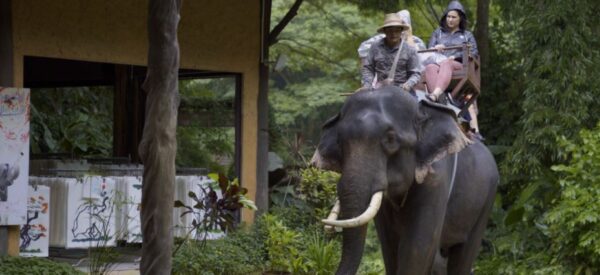Bruce Poon Tip is not “the last tourist,” but he’d like to be considered one of the first – a least by his definition of the term. Because the founder of G Adventures (also entrepreneur, author, and now filmmaker) would like to change the meaning of the word ‘tourist.’
More precisely, he’d like to change not just the word, but the world, by the very nature of people going on holiday – a timely sentiment today (Sept. 27) as the global travel industry celebrates World Tourism Day with the theme “rethinking travel.”
Addressing delegates at the recent ACTA eastern regional summit in Toronto, Poon Tip, pegged as a keynote speaker for the event, presented a passionate argument that travel should not simply aim to return to a pre-pandemic normal and encouraged travellers to change their mindset and remember the true purpose of travel – experiencing new destinations and cultures.
Showing a slide of a cruise ship in the middle of a spectacular fjord to demonstrate his point, he mused, “This is probably the greatest example: A ship, in Alaska, that announced a go-kart track as part of its (offering). And none of us thought that was odd.”
“You know,” he joked, “I’m going to go on vacation and maintain my go-cart hobby!”
But he wasn’t joking when added, “This can be anywhere. It’s no longer relevant where the ship is going because all you care about the go-kart track… with fjords and whales jumping around in the background… I for one find that ridiculous!”
With that the Toronto-based travel exec challenged travel agents to help change the mindset of travellers and not simply be part of the commoditization of the travel experience, which he maintains should instead be used as a “force for change” that is meaningful to travellers and the communities in which they travel alike.
“We should be fighting back to be better because I don’t think (pre-pandemic) normal was great,” he said.
Poon Tip’s sentiment is further amplified in “The Last Tourist,” a 140-minute documentary, executive produced by the G Adventures founder and directed by Tyson Sadler, which was just released for streaming on Crave in Canada after a run on-demand and in theatres in April.
The project, whose more minimal nature at the outset, Poon Tip explained, gradually developed into a full-length feature worthy of the seriousness of the subject, examines the history of modern tourism, shining a light on a side of the industry that many travellers might be unaware of and exploring important issues including animals suffering for entertainment, orphaned children exploited for profit, and developing economies strained under the massive weight of foreign-owned hotel chains.

Viewers meet local activists and entrepreneurs who see opportunity for positive change, and are leveraging tourism to preserve cultural heritage, sustain wildlife, and support the social and economic wellbeing of communities.
Filmed in over 16 countries, the film reveals and examines “the real conditions and consequences of one of the largest industries worldwide through the forgotten voices of those working in its shadow. The role of the modern tourist – who are unintentionally destroying the very things they have come to see – is on trial.”
Commentators include some of the world’s leading travel and tourism visionaries including Dr. Jane Goodall (Jane Goodall Institute, United Nations Messenger of Peace), Lek Chailert (Save Elephant Foundation), Gary Knell (National Geographic), Meenu Vadera (Sakha Cabs For Women) and Jonathan Tourtellot (Destination Stewardship Center), as well as Poon Tip himself, with the mission to empower audiences with knowledge and inspiration to make a positive impact and fundamentally change the way we travel.
“Travel,” the film declares, “is at a tipping point” with over-tourism in particular magnifying its impact on the environment, wildlife, and vulnerable communities around the globe.
The good news, especially as the world emerges from the pandemic when people were “forced to go into hibernation and re-evaluate,” says Poon Tip, is that travellers “are being much more intentional and purposeful with their holiday decisions – they are asking more questions about where their money is going, and whether it is helping to support local communities, which is exactly what we need.”
Travel, Poon Tip believes, is a privilege, not a right, and an experience that should push people out of their comfort zones.
“In order to have a truly transformational experience, you should leave your comfort zone when you travel,” he says. “We want people to be comfortable when they travel, whether it’s a hostel or the Four Seasons, but don’t mix that up with ‘comfort zone.’
“One of the main messages of The Last Tourist is that we’re born explorers. But society makes us tourists… If we could get to a place where the money you spent on holiday stayed in that local economy, and where we could create wealth distribution with a $10-trillion industry, we can really make travel a force for change…”
And that might mean engaging with local businesses, like eating in a restaurant that employs at-risk youth; meeting or staying with a local family; visiting (and buying something) at a women’s craft collective; volunteering; or simply joining a cooking class.
Or as Poon Tip puts it, “embracing that two-way experience and imbuing tourism where everyone benefits” – rather than riding go-karts.
At the same time, he adds, “If you want the comforts of home, maybe you should stay at home.”
In addition to Crave, The Last Tourist is available on video-on-demand via Apple, iTunes and on HULU. See the trailer below:

